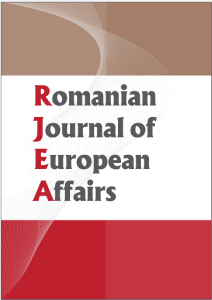In the autumn issue of the Romanian Journal of European Affairs, the contributors bring forward topics related to: the EU economic crisis, the transatlantic economic relations, the energy security challenges in the Arctic region, the Croatian accession to the EU and some developments in the protection of the Hungarian national minority in Slovenia.
The EU Economic Crisis – Reflections in the Opinions of Citizens and Experts
Nicoleta Corbu, Oana Ştefăniţă
Abstract:
Perhaps one of the most important challenges that the EU is currently facing is that of building public support for the Union project as the economic crisis develops, confidence in the EU future is weakened and member states turn to their own boundaries. Therefore, this research aims at identifying the public opinion on the economic future of the European Union in the particular context of the euro crisis, given the fact that utilitarian considerations represent a key driver for the Europeanization process. At the same time, we compare expert opinions about the impact of the crisis on the future of the European Union, as well as the perceptions of ordinary people. To accomplish the research goals, we conducted expert interviews with 11 of the most prominent economic experts in Romania and a national survey (N=1002). The study supports the perspective that citizens’ opinions about the economic evolution of the European Union are largely based on their sociotropic and egocentric economic assessments. The crisis influences the perspectives on the EU, but only by tempering optimism, turning it into a moderate view. This result can be extended to other Central-Eastern states as well, due to their resembling paths. Also, experts indicate various scenarios when referring to the impact of the crisis on the EU’s future, but beyond the variations, the prospects are neither optimistic, nor pessimistic, but rather moderate.
Keywords: Central and Eastern Europe, economic crisis, euro, European Union, Europeanization, the EU’s future
Transatlantic Economic Relations and the Prospects of a New Partnership
Florin Bonciu
Abstract:
The paper analyzes the international context in which negotiations between the European Union and United States on a Transatlantic Trade and Investment Partnership have been launched in July 2013. This context includes both the repeated failures of the Doha Round negotiations as well as the previous attempts and achievements of the European Union and United States to create a transatlantic partnership. The author considers that the current circumstances are more favourable for the successful finalization of the transatlantic partnership but, at the same time, stresses the sensitive issues that may delay or divert the negotiations. The paper concludes that there are many possible immediate positive consequences on economic growth and creation of jobs of the Transatlantic Trade and Investment Partnership as well as a high potential to expand its implementation in North America through NAFTA and in some other countries that have free trade agreements with either the European Union or the United States.
Keywords: economic integration, European Union, free trade area, globalization, NAFTA, post-Doha Round negotiations, TAFTA, Transatlantic Trade and Investment Partnership, United States
Rim versus Non-Rim States in the Arctic Region: Prospects for a Zero-Sum Game or a Win-Win One?
Ana-Maria Ghimiş
Abstract:
The present paper aims to develop a critical approach on one of the most urgent energy security challenges: the Arctic region. Until recently, it was considered to be a frozen desert, upon which no one raised any legal demands or interests. The global warming, the technological development and the increased need for energy resources had transformed the frozen High North into a very hot spot, where states like US, Canada, Norway, Denmark or Russia started an energy race that threatens to escalate. The Arctic became a strategic area given its opportunities: besides the energy resources, new commercial routes could become available for a longer period of time. But, due to legal uncertainties, the lack of coherent and direct legal procedures of international law, the Arctic game is an open one, in which any state can intervene and ask for a solution that is suitable for its interests. This aspect complicates even further the already unstable region. Some of the actors see the region as an international area, as a common good, where everyone has the right to explore or exploit, while the rim states see the Arctic in sovereign rights terms. Therefore, the game tends to complicate as non-rim players (the EU, China, Japan, NATO and South Korea) want to intervene in the region and try to influence its development.
Keywords: Arctic, game theory, non-rim states, win-win game, zero sum game
EU Enlargement and Migration: Scenarios of Croatian Accession
Wadim Strielkowski, Kristýna Šárková, Tomasz Żornaczuk
Abstract:
This paper analyzes possible incidence of pending Croatian EU accession that is to take place on the 1st of July 2013, on the labour migration from Croatia to the European Union. We apply panel data estimators using the data on emigration from 18 EU countries into Germany (which is the EU country with the largest share of ex-Yugoslav and Croatian migrants) in order to construct possible scenarios of Croatian migration to the EU.
Three scenarios of migration – pessimistic, realistic and optimistic – are drawn and the sensitivity of estimated coefficients on migration from Croatia into Germany during next 25 years is further discussed in detail. We conclude that, similarly to hypothetical Turkish accession, Croatian EU accession is not going to cause massive migration inflows.
Keywords: Croatia, EU enlargement, international migration, panel data, seemingly unrelated regressions
Hungarian-Slovak “Cold War” and the Question of “Hungarians Abroad” in Hungary-Slovakia Relations
Galina Nelaeva
Abstract:
The question of EU relations with countries of Central and Eastern Europe (CEE) has been widely researched and debated both in political circles and the academia, especially in the light of the EU accession. Such issues as human rights, including minority rights, have been examined in relation to the states’ compliance with the Copenhagen criteria. However, the issue of minority rights (in particular, their prominence in bilateral relations of states) after accession has not received much scholarly attention. Hungary and Slovakia, two post-Communist states of CEE, aspired for EU membership for a number of reasons, one of which being the EU potential in bringing societal stability to these countries; both joined the European Union in 2004. The relations between these two countries, however, have not improved, they even worsened. This article seeks to examine the question of worsening relations between Hungary and Slovakia in relation to the issue of minority rights. It argues that an inadequate and inconsistent EU approach to minority rights (generally considered a domestic question) can lead to further societal instability in these two countries. Re-conceptualization of the EU approach to minority rights is necessary, if the EU is to remain the stabilizing power in the CEE.
Keywords: EU accession, minority rights
The Hungarian National Minority in Slovenia: Assessment of Protection and Integration after EU Accession
Sigrid Lipott
Abstract:
The following paper will focus on the issue of the Hungarian minority protection in Slovenia. The first section introduces the Hungarian national minority, its main features and historical evolution. The second one gives a historical view on the practice of minority protection towards Slovene Hungarians, from Communist Yugoslavia to the ‘Europeanization’ process in the country. Further on, the level of minority protection will be analysed both at theoretical and empirical level: firstly, through the theoretical analysis of the legal status of the Hungarian minority, taking into account five main headings (education, use of language, political participation, cultural life, information and the media); secondly, through the results of a field research carried out among minority members, in order to find out the nature and extent of possible discrepancy between theory and practice. The main research hypothesis is that Slovenia has established a successful model of minority protection in what regards the Hungarians. This statement is to great extent confirmed by the analysis of minority policies and legal provisions and, with some specifications, by the analysis of opinions and feelings of ‘qualified witnesses’ belonging to the Hungarian community.
Keywords: Hungarians, integration, minority, protection, Slovenia






